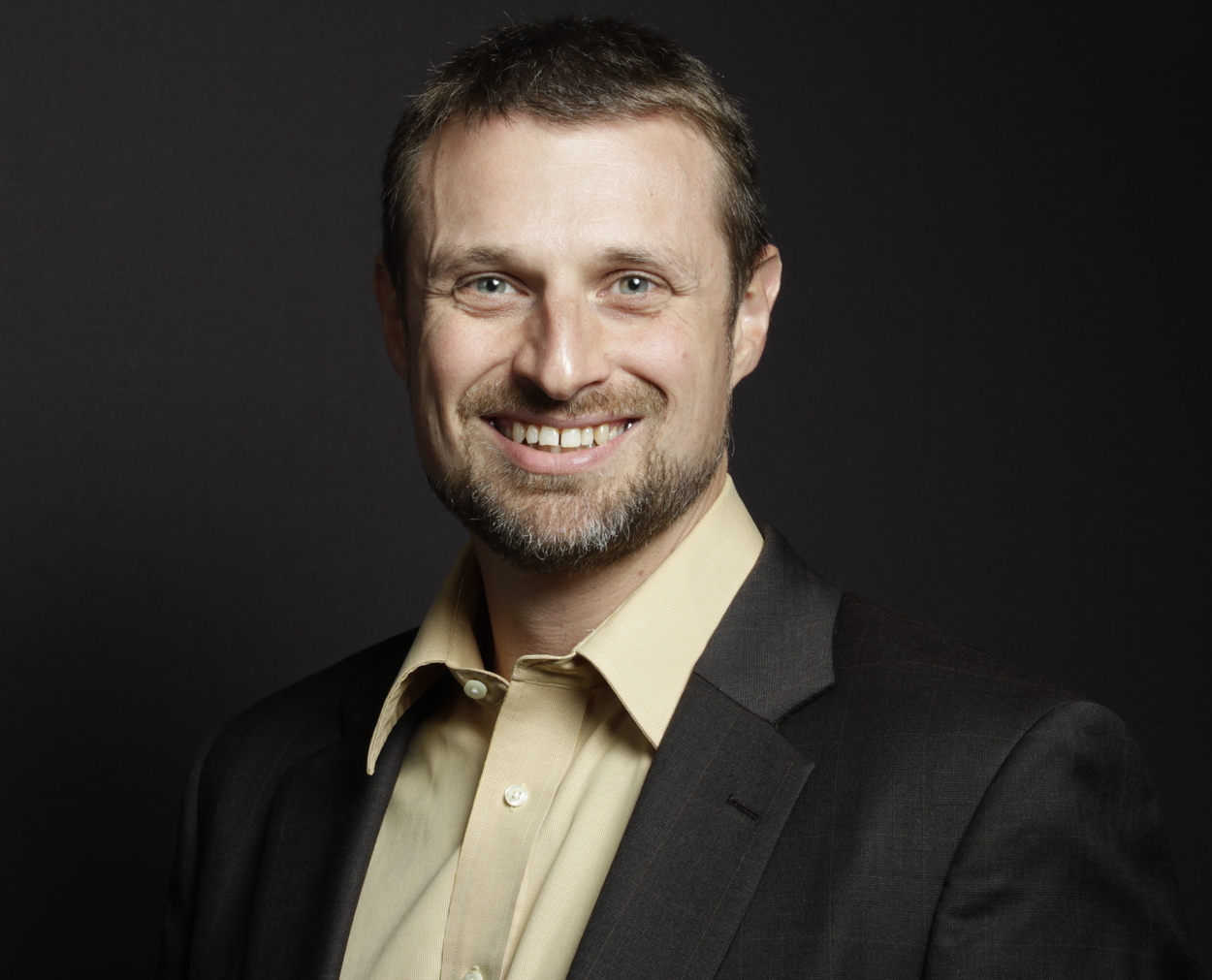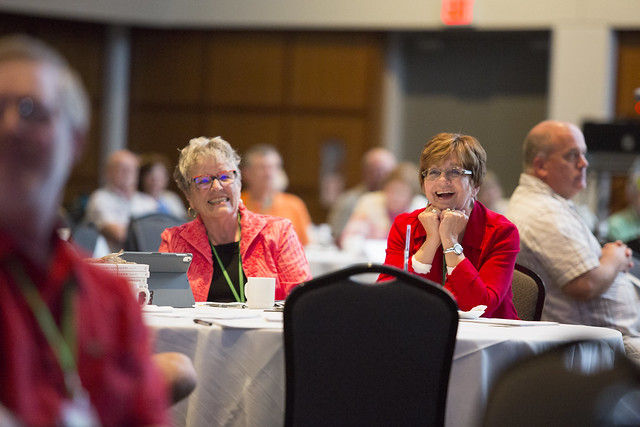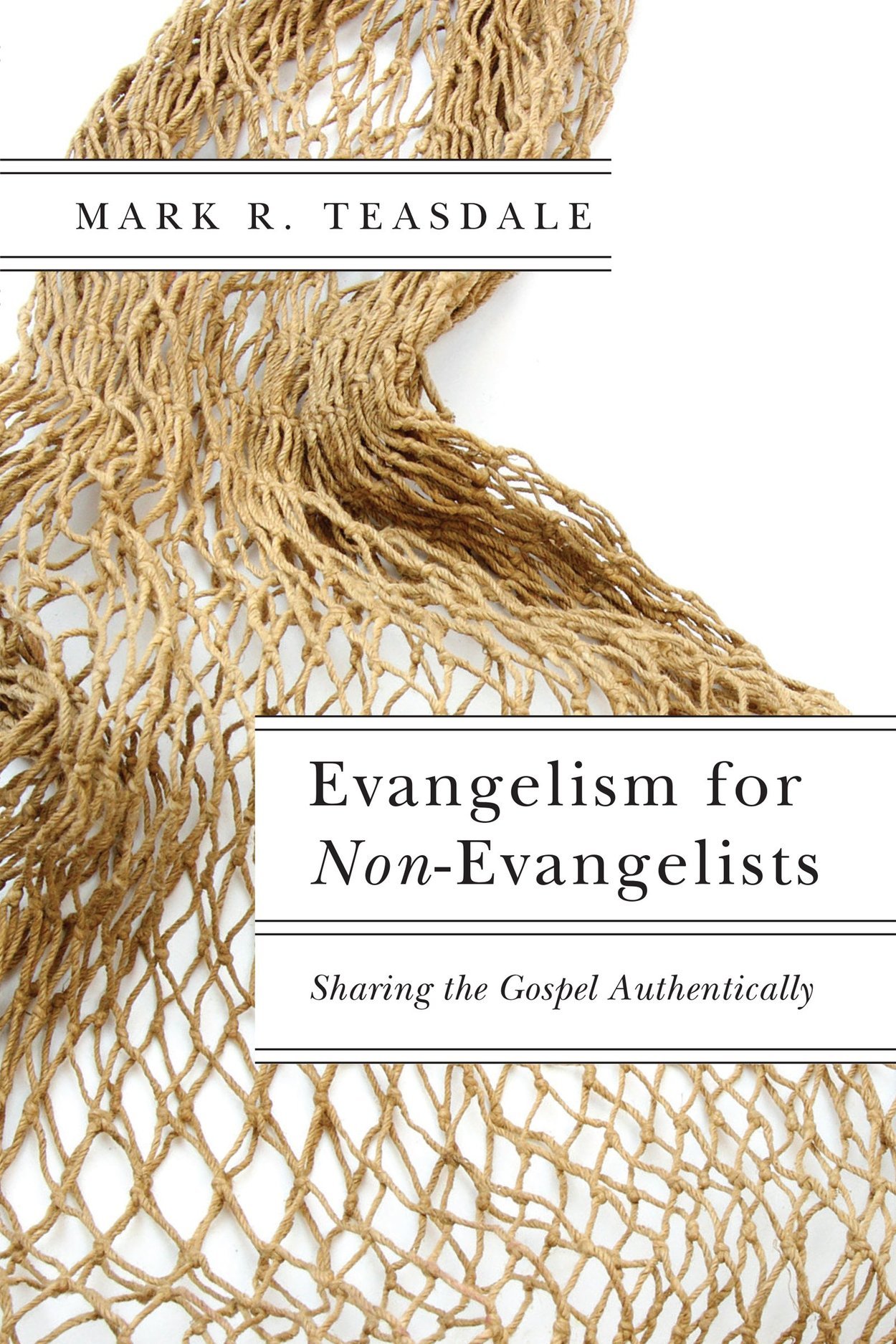
Teasdale to share formula for evangelism

Rev. Dr. Mark Teasdale will present on evangelism a the 2019 Annual Conference, June 7, in Bismarck. Photo courtesy of Mark Teasdale.
"Sometimes evangelism takes years. You live life with people and share faith with them,” says Rev. Dr. Mark Teasdale, professor at Garrett-Evangelical Theological Seminary. Teasdale will share a formula for evangelism during two teaching sessions at the 2019 Dakotas Annual Conference, Friday, June 7, at the Event Center, Bismarck, North Dakota.
You will find Dr. Teasdale in the mornings at the YMCA with a group of guys that show up at 5 a.m. to work out. He met his personal goal to bench press 300 lbs., three years ago. “I do my evangelism there with the group,” says Teasdale. “There is a variety of faith viewpoints in the group; one person is a lapsed Catholic, another a lapsed Greek Orthodox. We have our conversations about faith.”
It is all about building relationships, having conversation, and listening, Dr. Teasdale says. “You develop a relationship with people and have a conversation about faith. There is one guy in our workout group who is atheist. He often will bring up a topic that leads to a spirited conversation.”
The workout group goes out to have breakfast each week. One of the guys in the group recently passed away. Rev. Teasdale was invited to perform the funeral. “He was Baptist but had strayed. It was a gift for me. It was an opportunity to sit down with a diverse group of people and share the goodness of God. I try to honor what I teach,” he says.
He has been married for 22 years. He and his wife, who is from Siberia, have two children, a daughter who is 13, and a 10-year-old son. “When I did ministry, I was in youth ministry,” He shares. “I still work with youth ministry. I run everything past the youth.” Learn more about Dr. Teasdale here.
Teasdale took a few moments to answer some questions about evangelism. Everyone is invited to join the conversation and learning time about evangelism on June 7. You can find the registration information and details here.
What is evangelism and why do so many people shy away from it?
Evangelism is simply sharing the Good News, with emphasis on the good, in a way that invites people to respond.
One of the problems that most people have with evangelism, particular in the current cultural setting, has to do with the way people have understood evangelism to be practiced in the past. It is not evangelism itself but the way that it has been practiced in the past that has hurt people. That is what people are reacting to. It is not that people are against the Good News. It is that people have been approached about the Good News in ways that have not been inviting and brought about goodness. There have been ways that have not been grounded in the goodness and that has been the problem.

Attendees at the 2018 Annual Conference enjoy the speaker. Photo by jlynn studio.
Research from the Barna group reports data that those that are part of Generation Z, people in their twenties, are far more open about having conversations about faith with their friends than previous generations were. The idea that people are hostile towards people sharing with their friends about faith simply is not so. They are open to talking about faith.
Statistics are showing that young people are open to faith and they are looking for meaning. You can look anywhere for meaning in culture. There is shut-down towards angry proselytizing. Conversations have to be premised on good, not on condemnation or anger.
How do we avoid the uninviting approach or proselytism?
Proselytizing is trying to make someone look just like you, trying to make a carbon copy. Andrew Walls wrote a great article about this to tell us about the difference. We tend to run into problems when we try to make someone look and act just like us—you must live and act like me to be Christian. The goal of evangelism is conversion. A convert is someone who decides to follow but then listens to the Holy Spirit. They become who God wants them to be, which may not be a ditto of what I am. You create a disciple of Jesus Christ who walks by faith not by what someone told them they had to be.
Conversion or evangelism is much more relational, more conversational. If you are evangelizing you say, “Let me talk about what is good in my life and let me hear about your life.” There is an opportunity for mutual transformation with the prayer and the hope that the Holy Spirit is leading all of us closer to Jesus Christ as a result of the relationship and conversation.
Elaine Heath talks about releasing the outcomes in evangelism. We know that the Holy Spirit will show up and we release the outcomes. We are not expecting people to look like us. We don’t know what they will look like, other than the Holy Spirit will guide them to become disciples of Jesus Christ.
What are some ways a church, as a congregation or a body of Christ, can evangelize in their current setting?
Given the immediate situation in The United Methodist Church, I think that the number one thing we can do to evangelize is to demonstrate what Jesus said to the disciples at the last supper, “They will know you are Christians because you love one another.” What matters is that we can show the world that we can do whatever we are going to administratively and still love one another. It may be that there are points of conscience that don’t allow people to stay in the same administrative structure. The polity and administrative structure should not get in the way of fulfilling the Great Commission being accomplished. The truth of the matter is the church has been reorganizing itself since its inception. This is nothing new. The witness of the church can remain intact if we can show that we can love one another.
The number one thing the church can do is to demonstrate that we have the capacity to disagree, even disaffiliate, but do it in a way that demonstrates mutual respect and love for one another in the process. We could show the world a whole new language, something that the world does not see—demonstrate the practice of reconciliation as an ongoing practice. That will be a witness to the world, something that does not exist.
How do we get people who are currently not involved in the church, to evangelize?
Evangelism forces you to ask, what is the ultimate good that you are holding onto? Evangelism does not allow for anything phony. So, if the reason you show up at church is that your family always went there and that is it, maybe that is why you are not inviting others to come. If all you have is your family tradition, if that is all you think that God has for you, there is some Good News for you. There is a whole lot more here.
Evangelism forces out into the open, what is that good thing that you are holding onto not just today but in the future. I deal with this with the students at seminary. Many of them are in their twenties. They are excited about how they are going to make the world a better place in the name of Jesus. At some point, they ask questions about death, and where do things move beyond this world — evangelism deals with both, the immediate issues now and tomorrow. Evangelism speaks to eternal life—peace, forgiveness, mortality.
We need to start with everyone in the church. We have not been true to the notion of salvation. We look at salvation as just being about getting ready for death or just about helping people in the here and now — a general sense of comfort. We don’t have a full understanding of how God can transform everything to the good. We miss the invitation to enjoy that good that God offers eternally and participate in missional work. When we start with each of us in a church community, it is a launching point to make a difference in the world.

How do we get people inspired to evangelize, not to take it or leave it?
We are called to action. Evangelism is not passive. We often think of evangelism as salvation I receive, and that’s it. There is no view of the implications for how I live when we think about evangelism this way.
Evangelism is not inviting people to be passive. For example, saying a prayer that everything will be all right, and that is the end. It is about continually inviting, being active, and being open to blessings. It is about all of creation from God, people, the land, the water and more. There is an evangelistic witness when I am embodying that salvation and inviting others to share in it. It may be other people or the land itself. All of that is evangelistic—people around us or next to us are invited in, when we care for all of God's creation because they see the witness.
How do we not just hop onto the next fad or the next big thing?
There seems to be a shift on evangelism right now. There is a cyclical nature to what is a fad. We need to recognize the broader culture the church sits in, is driven by the market place. We need to acknowledge that there is broader logic where we live. Getting away from that logic is hard. It is how we think.
One way I teach evangelism is through the evangelism equation. There are four steps to the equation. Step one is asking, what is the good thing that keeps you being a Christian? Why don’t you walk away? You share your personal experience of the goodness of God in your life through Jesus Christ. Step one cuts through what is the latest thing or fad. It is not about the newest thing. It is about looking inward, seeing where God has reached in, met you, and transformed you. It is so good you won’t let go of it. When we get to that level, that cuts through the noise. That is something we hold onto no matter what. It is a driving force.
I lay that out in my book, Evangelism for Non-Evangelists. It is all about getting to that heart experience. Share where God has met you. Whatever that good thing is that means so much to us, is ultimately what we want to share about God’s salvation with others. Then we share as a community. Share those starting points with each other, as a congregation, or a small group. That is where the transformation and break through from the Holy Spirit happens. It is genuine.
The word evangelism isn’t magic. There are no magic words, just sharing true meaning in your context. Then talking about those experiences and sharing in the apostolic nature of the church, making meaning in the context of the church. We have to listen well to the people us around.